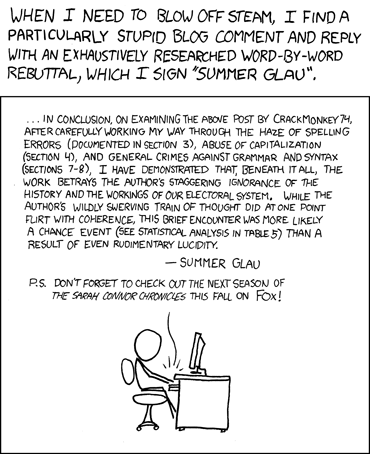What’s In A Name? A Lot, Actually
The “Real Names” debate has been fascinating to watch, because it such an intriguing melange of issues – social conventions, technical requirements, best practices, community responsibility – rolled into what would on the surface seem to be a very simple problem. After all, what we’re really talking about is what value to let people put (self assert) into the name field that is used prominently in social sites.
 This debate is really about the concept of pseudonymity online – an argument that has been going on forever. While pseudonyms and their necessity have long been understood and accepted in the real world, for some reason the same logic is being discredited when the concept is extended to the online world.
This debate is really about the concept of pseudonymity online – an argument that has been going on forever. While pseudonyms and their necessity have long been understood and accepted in the real world, for some reason the same logic is being discredited when the concept is extended to the online world.
As a parent, I know and understand the desire to create a safe haven online for my child. And as someone who does participate in online discussions on blogs and other social media, I am well aware of the problem of spammers and trolls. But these so-called “Real Name” policies have absolutely nothing to do with these issues, which are used as a false crutch to lend legitimacy to the argument. You just have to watch scenes from Capitol Hill, or the British Parliament, or this epic from the South Korean Parliament to see that knowing the commenter does absolutely nothing to tame uncivil discourse (as I hear shouts of “You Lie”!). And since no one is going to pay for any kind of identity proofing to actually validate the identities of these self-asserted “real names”, the promise of protection offered by such a policy is actually a blatant lie.
But what is even worse is that these policies create a discriminatory, exclusionary environment against those that need pseudonymity the most. Kee Hinckley wrote an amazing post that describes why allowing pseudonyms is a crucial part of society’s fabric, especially when brought online. What really gets me is the hypocrisy of social networks touting their role in social and political movements like the Iran and Egypt uprisings or support networks for LGBT youth, and then instituting policies that would remove the very protections that the people involved in those movements relied on. In the case of people organizing and posting during the middle east movements, pseudonymity was a key requirement enabling them to do their work without fear of reprisal on them or their families. And the fact that they were pseudonyms did not detract from us believing (trusting) them, as they built their reputation over time through their actions and voice online.
 (source)
(source)
The names we choose online are also key to establishing context for what we are doing, and even more important in keeping different contexts that we want to keep separate apart. While the ability to link disparate personae is getting easier every day based on complex data analysis on publicly available data becoming cheaper (I would point you to Bob Blakley‘s excellent “The Death of Authentication” talk if it ever makes it’s way online, but read commentary here), it is still not possible for the casual observer that we care about in a social sense (the one that would care if you are a gay rights activist who also happens to teach in their son’s school). These contexts also allow the building and establishment of reputations that would get diluted by all the extraneous noise that would come from combining them.
It is true that as commercial entities, Google and Facebook are well within their rights establish any sort of policy that they want, and that as consumers we are free to take our business elsewhere. But that argument misses a much larger reality. As much as we may want to deny it, Google and Facebook are an increasingly large part of the very fabric of our online existence, and exert huge sway over how the business of the internet is being shaped. When Randi Zuckerberg throws out ridiculous ideas that “anonymity must be eliminated online” (not just on Facebook, but everywhere on the internet), she’s not viewed as just another marketing executive, and it unfortunately has a great deal of influence. Eliminating pseudonyms on networks where “most of” the people are will exclude from these spaces the very people that need the social benefit of their network effects, as Danah Boyd (or should I say @zephoria) so passionately articulates. Being a social network comes with some social responsibility too, and as Paul Carr recently reminded us it would behoove all of us (in the tech industry) to remember that. Because “Real Names” isn’t about eliminating spam and increasing civility. It’s really about ensuring that the data we have online is as real as possible for the benefit of the advertisers who are paying for accurately profiled targets. And I’d argue that even that is a false premise.
